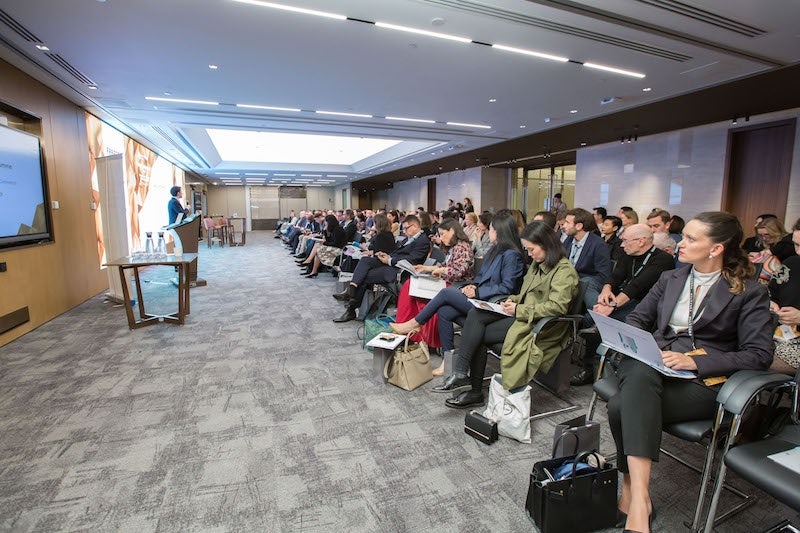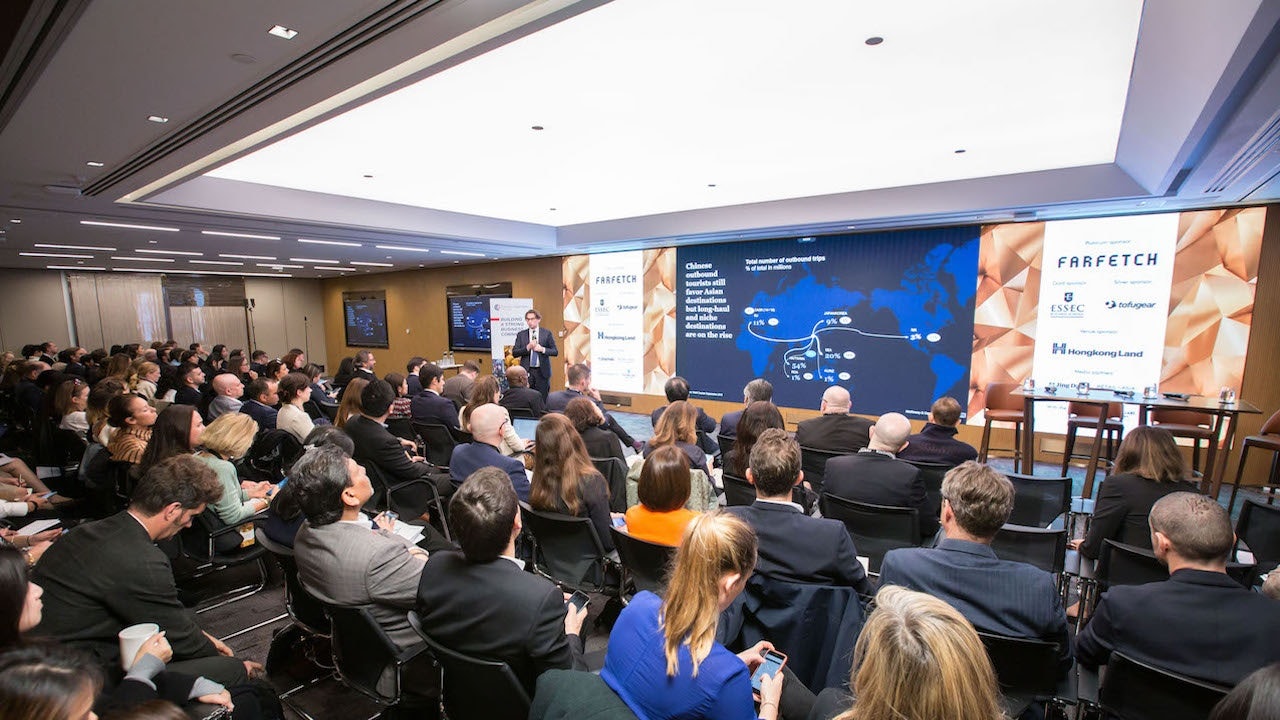On January 20, the luxury industry welcomed the 4th edition of the Luxury Symposium at Charterhouse in Central, Hong Kong. Here, over 200 decision-makers from brands and retailers in the greater APAC region gathered to learn more about the future of China’s luxury market. Hosted by the French Chamber Hong Kong, key topics included how landlords and retailers are adapting to the ongoing Hong Kong protests, where luxury brands should look for future growth, why there needs to be a greater emphasis on experiences, and more. We highlighted key conversations from the event below:
Luxury — What's Next#
by Daniel Zipser, Senior Partner, McKinsey & Company
Based on the research from the management consulting firm McKinsey, Zipser began with a macro view of the Chinese luxury market while clarifying some common misconceptions. Many brands are shifting their attention to mainland China, as the Chinese government is determined to boost domestic consumption. Zipser believes that the experience of shopping overseas will still be attractive because of its novelty. Another refreshing finding is that while Chinese luxury consumers dominated one-third of luxury consumption, they are still learning about most luxury brands. For example, only 45 percent of the 1,000 surveyed consumers think the Canadian outerwear company Canada Goose comes from Canada, while 30 percent think it comes from Europe. Zipser pointed out that these types of consumer mistakes are even greater in the food and beverage industry, offering those brands the opportunity to tell their original story better or form a new angle in China.
Quick statistics:
- For the first time in the past five years, the number of high-net-worth Chinese families dropped (by 1.5 percent).
- By 2025, the number of Chinese upper-middle-class households will exceed those in Europe and the US combined.
China’s Digital and E-Commerce Ecosystem: How and Where to be Impactful Today?#
By Cyril Drouin, Chief eCommerce Officer, Publicis Commerce Greater China
Drouin revealed the reality of how the competitive nature of online marketing in China, and the key principles of navigating the digital sphere. For instance, Chinese consumers spend 80 percent of their mobile device time on Baidu, Alibaba, Tencent, and Bytedance (BATB), so brands need to split their media budgets between those platforms. Those giants hold the keys to online data, so brands must work with them and understand how to smartly gain access to the data. Consumers’ online journey is very fragmented these days, so companies have to stay on brand to offer quality experiences.
Quick statistics:
- Chinese consumers can be quick to decide: A business must win them over within a 24-hour period.
Omnichannel Best Practices: Sephora#
By Benjamin Vuchot, President Asia, Sephora
According to Vuchot, China is the top market for Sephora. One of the buzzwords in today’s beauty industry is “omnichannel,” and last year, we spoke to Vuchot about how Sephora is on the cutting-edge of omnichannel marketing via WeChat. At the conference, Vuchot clarified the brand’s approach, saying, “We don’t talk about omnichannel anymore, we talk about consumers.” Sephora also hopes to become an unbiased media source where consumers can review products and share beauty tips, and Vuchot reinforced the idea that, even in a challenging retail landscape, “bad retail is dead, but good retail will always have a future.”
Quick statistics:
- Compared to customers who interacted with Sephora on a single channel, those who interacted with the brand on omnichannel spend three times more with double the number of transactions over the past 6 months.

From Creativity to Commerciality#
Alexis Bonhomme, VP Greater China - Commercial, Farfetch
In his talk, Bonhomme gave a dynamic speech on their lessons in heading Farfetch's localization effort in China. For example, from their experience, there are a couple of reasons for what makes an A-listed KOL excited for collaboration: Is there an opportunity in global expansion? Is there the capability to build a creative campaign in a longer-period? He also addressed why Farfetch acquired NGG: “For e-commerce to make sales, they often work on pricing. It’s the game of online promotions.” he said. “But now (e-commerce) needs to become more vertical. We are not buying brands, but an accelerator of brands.”
Driving Retail Innovation#
Moderated by Anson Bailey, Partner KPMG, Head of Consumer & Retail ASPAC; Zoe Cheng, Head of Growth, Cosmose; Carson McKelvey, CEO, Tofugear; Tim Wu, board member and program director, Eureka Nova (New World Group)
On this panel, speakers addressed what’s stopping retail innovation. Tofugear’s CEO, Carson McKelvey referenced in an executive workshop they hosted, that a consistent problem is a brand's inventory being not very user-friendly. Traditional retailers have a lot of brick and mortar stores but not a lot of fulfillment for e-commerce. Brands should consider those brick and mortar stores as also fulfillment centers. While the director of Hong Kong New World Group's tech accelerator, Eureka Nova, Tim Wu said fashion has a tech talent problem: “Most tech talents want to stay in a tech company. Unless you have a culture to nurture these people, they don’t stay.”

Conversation: How landlords Adapt Their Offering#
Raymond Chow, Executive Director, Commercial Property, HongKong Land with Alain Li, CEO APAC, Richemont
Raymond Chow and Alain Li addressed the changing landscape of retail in Hong Kong. “The Hong Kong situation is going to be a true test to the (landlord and brand) partnership,” said Li. While Chow advocates for HK landlords to shift their thinking to be more like retailers. Both speakers think positively about the future. Chow reported that landlords are actively making changes. For example, some contribute more than 20% of the space on F&B to address the shifting trend that people not just want to shop but experience something new. There will also be more pop-ups, which fundamentally change the business model for the landlord but they have to adapt accordingly.
Everything is Experience/ Experience is Everything#
Moderated by John Mefford, Managing Director, Accenture Interactive APAC with Teresa Muk, Head of Brand, Swire Hotels; Isabelle Zhuang, China President, Luxury Business Institute; Billy Ip, Principal, Woods Bagot
Accenture’s John Mefford pointed out experience is a key factor to draw Chinese young consumers, and brands need to accelerate their progress in understanding this segment. He predicted that by 2030, Chinese consumers will grow on average 15 to 20 years younger than the West. Luxury Business Institute’s Isabelle Zhuang resonated and added that many stores may add a lot of tech gadgets to enrich the experience, but technology is still just a tool to serve customers and a human-centric store approach is still essential.

Valuing the Values: Engaging Through Storytelling#
Simon Nyeck, Director, Centre for Excellence in Luxury, Arts & Culture; ESSEC Business School with Elise Gonnet Pon; Managing director of APAC, L' ECOLE, School of Jewelry Arts Supported by Van Cleef & Arpels; Angela Shum, Brand General Manager Greater China; Cha Ling, LVMH
Three speakers at the conference emphasized the value of luxury. ESSEC Business School’s Simon Nyeck offered a presentation bringing the history and depth behind luxury. He addressed that a sale is just one aspect of the business, and brand creators need to remember that “Luxury is culture and it needs to be relevant to the whole society. The luxury audience should be wider than your luxury consumers.”
Quotes are edited and revised for clarity.
